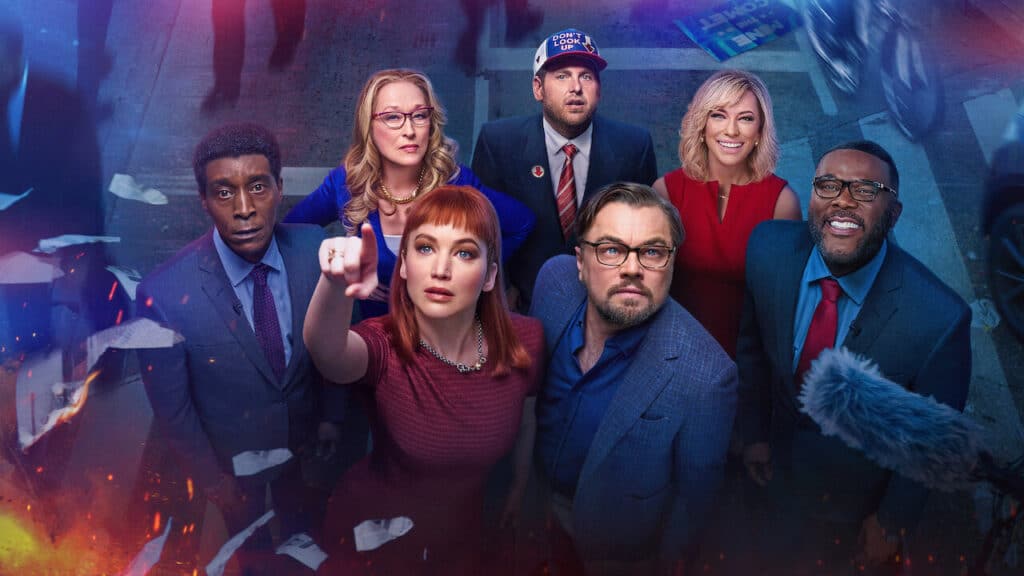
Spoiler Alert: I will not be giving a blow-by-blow account of this film’s plot. Nevertheless, I must say that I made no effort to avoid spoilers in what follows below. If you have not seen it yet, proceed at your own risk!
Don’t Look Up, directed by Adam McKay and featuring a star-studded cast, premiered on Netflix on December 24, 2021 and can be described as a satirical, apocalyptic, science-fiction film. It’s also often downright funny, which is weird, considering what it’s about – two scientists (Leonardo DiCaprio and Jennifer Lawrence) struggling to get anyone to take note of the impending collision between a comet they have just discovered and our planet. It is easily understood to be an allegory for society’s reaction to global climate change, and/or other worldwide catastrophes such as the Covid pandemic or the current democracy crisis.
The film has generated largely negative reactions among professional reviewers, with a few exceptions. My own informal polling of friends and colleagues has turned up a wide array of reactions. For instance, in a back-and-forth over Facebook, a British friend of mine and I concluded that our differing reactions (I loved it, she thought it was terrible) might be due to our responses to the affective dimension of the film. She seemed to find the characters unrelatable and the film’s humor flat. With the film – for her – having not enough going for it besides its message, the delivery of that message seemed overbearing. Unnecessary to those like herself who are already convinced of the urgency of our global crisis, and probably unconvincing to those who are not.
We agreed, furthermore, that perhaps our differing reactions are at least partly cultural in nature – that much of the nuances of character that were meaningful to an American viewer might not have resonated as much with a British viewer. Whether or not that Trans-Atlantic generalization holds up, it does seem we were in agreement that the film’s impact relies on metamodern components. (Side note: she is a seasoned writer on metamodernism theory.)
For me, the film’s most substantive metamodern dynamic is its braiding between brute-force messaging, humorous satire and depiction of small, intimate moments. If a viewer – for whatever reason – does not connect with the intimate aspect of the film, I can understand how it might not work. Among the negative reviews I’ve seen, it seems that a strong majority share some version of my friend’s reasons for disliking the film.
So, I’ll be focusing here on seven details of the Don’t Look Up that, for me, made it a touching metamodern story about human beings, not just a satire or a message movie.
1) Kate and Randall (the scientists played by Lawrence and DiCaprio), each in their separate locations, upon finally seeing the comet with their own eyes in the night sky, have reactions that are as much infused with wonder as with dread. Randall even speaks directly to the comet, as if addressing a dear friend: “There it is. There you are.” And, in describing his reaction to Kate, over the phone: “It’s horrific and it’s beautiful at the same time.” There is something profound in the capacity to witness the grandeur of a celestial body that is hurtling through space, heralding the destruction of everything you know. The film can be described as metamodern in its recognition of such polarities.
2) Although the film involves some flashy editing and special effects, the dialogue is not that of a Hollywood blockbuster film. Much of it is more arthouse-film style, naturalistic dialogue. We’re allowed to stand close to the characters and experience realistic moments with them. Worlds of story are implied in a few lines. For example, while we only see a few snapshots of Kate and Yule’s developing relationship (Yule is a small-town slacker, played by Timothée Chalomet, who ends up pursuing Kate), much is communicated in one interaction. While lying on a rooftop at night, gazing upward – the direction of their impending demise – Yule brings things back “down to Earth” when he asks Kate if she wants to make out.
– Kate: Why not?
– Yule: You can’t [just] say ‘why not?’ It makes me feel like shit.
– Kate (more enthusiastically): Sure, whatever!
– Yule: That’s better!
We ascertain that Yule is more eager about the relationship than Kate, and more willing to be vulnerable. Kate values her connection with Yule, but emotional distance is a part of her personality that she’s not willing to abandon. Yule, perceptive enough to understand that this jaded affect is a big part of what makes Kate Kate, still asks her to be just a little more vulnerable, a little more human, to respond to his invitation with anything other than “why not?” “Sure, whatever!” is meeting him halfway.
The understatedness of this dialogue and the stripped-down scene itself does some interesting work: Rather than leading the viewer to give way to either nihilistic cynicism (“this couple is doomed”) or to force on us a cliched tale of finding-true-love, what it highlights is the meaning and even sweetness in the impact of our smallest gestures toward one another.
While this scene could be read as not majorly consequential in the scope of the film, I highlight it because the embedding of such tiny, intimate, micro-intricacies into an otherwise bombastic, Hollywood macro-narrative of planetary demise strikes me as a kind of metamodern braiding that effectively – and affectively – brings me deeper into the work. It might be seen as hugely allegorical as well: meeting halfway and coming toward one another is something the movie is asking people of various stripes and persuasions to do.
3) Much of the dialog, in fact was improvised. According to various publications, the following bits were invented by the actors on the fly:
- Meryl Streep (the U.S. President) and Mark Rylance (a weird tech titan) improvised the scene where he informs her that she will die by being eaten by a “brontaroc.” This then provided the inspiration for an add-on scene during the credits where we watch this take place.[source]
- Jonah Hill (the President’s son and Chief of Staff) improvised most of the insults his character directed at Kate. [source]
- Ariana Grande (not primarily known as an actor, here playing singer Riley Pina) improvised almost all of her lines in the movie. [source]
- Leonardo Dicaprio improvised the moving final line just before the comet strikes, “The thing is… we really did have everything, didn’t we?” [source]
The intimacy that comes with improvised dialog adds a kind of mumblecore-ish warmth to Don’t Look Up, allowing it to be much more than a “message movie.”
4) The narrative power of Ariana Grande’s song is another surprisingly loaded element. Grande, one of the world’s biggest pop singers these days, plays Riley Pina, the world’s biggest pop singer within the reality of the film. Randall and Kate encounter her as fellow guests on a talk show. They are there to warn viewers of the end of the human race, while she comes across as an airhead, titilating viewers with vapid details of her celebrity break-up. Later, she is the featured performer at a “Just Look Up rally.” We expect a mocking parody of a pop performance. Instead, what we get is Grande’s gorgeous, knock-it-out-of-the-park singing voice, ultimately pleading with people to just look up. Cleverly, the first two thirds of the song (with the second third being a rap by Kid Cudi as his character DJ Chello) can be read as a standard romantic reconciliation duet. In the final third of the song, following the rap, Ariana/Riley explains, however, that “what he’s really trying to say…” is:
Get your head out of your ass
Listen to the goddamn qualified scientists
We really fucked it up, fucked it up this time
It’s so close, I can feel the heat big time
And you can act like everything is alright
But this is probably happening in real time
Of course, some of those lyrics deliver a blunt, cheeky wake-up call, that is motivating, but then the song also provides a profound call to simply be with the truth:
Celebrate or cry or pray, whatever it takes
To get you through the mess we made
‘Cause tomorrow may never come
Just look up
Turn off that shit Fox News
‘Cause you’re about to die soon everybody
Ooh, I, oh, I
Look up
Here it comes
I’m so glad I’m here with you forever
In your arms
“Celebrate or cry or pray, whatever it takes…” along with a message of true loving acceptance of the gift of life that includes its own demise: “Here it comes. I’m so glad I’m here with you forever.”
“Forever” could mistakenly be taken as mere Disney-esque naivete. The lyrics rather convey a recognition of end-times.
The song evokes a sentiment that some have named post-tragic consciousness. My way of defining post-tragic is a dignified, profound acceptance of loss. Not exactly an enjoyment or relishing of loss, but the capacity to appreciate the depth of human feeling that becomes possible in response to the tragic. The depth of Ariana/Riley’s song works against the expectation of shallow, affect-free parody that we were expecting. This play between the shallow and the profound, between parody and genuine affect is one marker of metamodern art.
5) To me, the most metamodern – and post-tragic – part of Don’t Look Up is the final dinner (or should I say “last supper”?) with Randall, Kate,their colleague Teddy (Rob Morgan), Yule, and Randall’s wife (Melanie Lynskey) and adult sons (Robert Radochia and Conor Sweeney). Once it has become clear that none of them has any influence over the fate of the Earth, they all end up together at Randall’s house to spend together what are likely to be the final moments of their lives. Whereas up until now the focus of the film – and that of its characters – has been very much outward and upward, here it turns inward, towards people’s most significant feelings, which turn out to be those they have for each other, and for the tiny, close-up details of their lives.
As a viewer, I found myself feeling that Randall’s relationship with his wife and sons was as important as whatever global fate was about to unfold. An especially touching moment for me was when Yule, who up until then had seemed like a bit of a tag-a-long, found a useful role, with his Evangelical Christian background – as the one who could offer a prayer to bless the meal. It didn’t matter how the others at the table felt about Yule’s God; what was important was that they all got to share a moment of dignified meaning making. As my co-editor Linda Ceriello pointed out, the filmmakers could have used Yule to take pot shots at conventional religious belief. Many a modern/postmodern movie would feature religious faith in order to portray it as silly and ineffectual next to science. This metamodern film allows for the truths of each, neither one able to negate the other; neither saving the day.
6) Montages. Throughout the film, there were frequent cuts from the main action to shots of regular people all around the world, engaged in ordinary activities. I see this as a metamodern oscillation between elements that are very self-consciously “smart cinema” and a more lowest-common-denominator, direct approach to evoking reactions to crisis. I was especially moved by the moment-of-impact footage showing animals valiantly and impossibly striving to escape an inescapable calamity. The look on that polar bear’s face was everything.
7) Finally, a few key lines from Don’t Look Up that challenge the postmodern cynicism to which, metamodernism is, in part, a reaction.
“Maybe the destruction of the entire planet isn’t supposed to be fun.” — Kate
“Not everything needs to sound so goddamned clever, or charming or likeable all the time. Sometimes, we need to be able to just say things to one another.” — Randall
And one that offers an affirmative metamodern stance, encouraging conviction in the face of the multiplicity of options and perspectives we so often find ourselves mired in these days:
“A man’s always got choices, Randall… Sometimes you gotta just choose the good one!” — Teddy
As it turns out, in spite of a luke-warm reception (at best) from most critics, Don’t Look Up is one of Netflix’s most successful offerings ever, setting a record on the platform for the most viewing hours in a single week. Presumably, based on its Rotten Tomatoes rating (78% at press time), a significant number of those viewers liked it. Some of them probably liked it for its message, some for its humor, others for its celebrity ensemble cast. Some, like me, may have liked it for all of the above aspects, which, braided with smart, sensitive, character-driven moments, and deep compassion for all of us grappling with the tragedy inherent in life on Earth, make for a powerful, metamodern tale that looks right in the face of the possible crisis without a sugar-coated Hollywood ending, but also with more than hapless despair.




